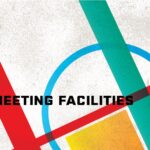Meeting facilities shift focus toward tech and startup crowds. Check out the 2017 Meeting Facility powerlist below.
A couple of summers ago, Hotel deLuxe, a boutique Portland hotel, decided to experiment with a parking lot it owns opposite its building. It converted the space on the corner of Southwest 15th and Yamhill into a temporary nine-hole miniature-golf course with picnic tables, a food truck, and beer and wine offerings.
The new space is what Stephen Galvan, Portland area director of sales for Provenance Hotels, which owns the facility, calls a “pop-up”— a temporary, open-air reception area, which planners make available for corporate functions and private events during the summer.
The parking lot conversion, which the hotel calls a “hit” with travelers and locals, is part of the lodging group’s effort to think out of the box when it comes to creating inventive meeting spaces.
“We have to be more creative,” says Galvan. “It is a little bit off the norm, but people are interested in it. It is quite fascinating.”
The meeting-facilities sector is upping its game to meet demand for unique event space. Event planners are responding to the changing business scene, particularly in Portland, where an influx of tech firms and startups is increasing demand for meetings that are casual, small scale, flexible and creative.
Contrast this with just a few years ago, when corporations would typically hold one large meeting a year and book 12 months in advance.
“Business is changing; meetings are smaller, and companies are holding more frequent meetings and booking last minute,” says Klint Kolbu, director of sales at the Westin Portland.
Among the changes are businesses’ approach to food and beverage at their events. More companies want to have unique Portland food and beverage brands served to attendees during breaks, such as Blue Star Donuts or Saint Cupcake.
“It is easy for us to send somebody out to purchase something that makes a unique experience for people in the hotel,” says Kolbu.
Recognizing the demand for custom event spaces, meeting planners at the Sentinel, another Portland boutique hotel owned by Provenance Hotels, recently opened what it calls the “Elk Space,” a freestanding, 1,100-square-foot area in the hotel lobby.
The types of clients that would typically rent this “soft meeting space” include tech firms, fashion people, production firms, says Galvan. They are clients that might want to hold one-hour meetings and then hold a casual event, sharing ideas over a craft beer.
The growing demand for specialized meetings and events is a boon for satis&fy, a provider of event and media technology, such as video and audio production, lighting and display.
The company, headquartered in Frankfurt, Germany, opened an office in Portland four years ago. At the time, Nike was its single client. It has since grown from two employees to 50 and expanded its client base to include start-ups and tech firms.
Nancy Schacht, managing director at satis&fy in Portland, said she has seen a lot of change in the local events scene since the company first opened.
“People are in need of small facilities where it is comfortable with nice setups, boutique-style, with interactive features” she says.
The kind of design features the company sees in high demand at events includes iPad technology, 3-D graphics and virtual reality.
“The smaller meetings are super boutique; it is about nice furniture and integrated digital components. Companies are not just relying on what facilities have,” Schacht says.
A drawback of the Portland meetings facilities sector is the dearth of midsize event spaces, she says.
“There are a lot of hotels but they are either large or small spaces. There is not a lot of in-between.”
The hotel construction boom in Portland may help alleviate this lack of mid-sized meeting space. By 2018 there will be 20% more hotel rooms in downtown Portland.
The new supply will increase choice for clients seeking to rent space, but hotels need to realize that their meeting rooms can’t be tucked away in the basement anymore.
“They have to make sure their meeting rooms are above a certain floor. It is about the view, and that it is logistically accessible. Nobody will book the room if it is in the basement and doesn’t have any individual character or charm to it,” says Schacht.
Recognizing this trend, the Hilton Portland, a 782-room hotel in downtown Portland with meeting space in the basement, recently added a 5,500 square-foot ballroom on the second floor. The new space boasts windows on three of the walls and a large skylight.
Outside of Portland, meetings facilities are seeing the same interest from companies in holding smaller events. At the Best Western Plus Hood River Inn, corporate events are the fastest-growing type of meeting for the hotel.
“For us they are not huge meetings — groups of 30 to 40 that want a casual getaway,” says Susan Lutton, director of marketing.
The hotel has seen an uptick in demand for meeting room rentals over the past couple of years as a result of Oregon’s growing popularity as a destination, says Lutton. This is particularly the case for weddings, which are up 50% over the past couple of years, she says.
The growing competition from hotels in Portland is on Lutton’s radar for 2017. The Hood River-based hotel is close enough to Portland, an hour’s drive away, that the Portland hotel boom could take away business.
“When there are that many hotels coming to market, it’s scary to us,” says Lutton.
As hotel construction proliferates in Portland, meeting facilities will need to turn a creative hand to holding events. Those that can tap into the demand for casual, flexible spaces have a good chance of fending off the competition.
{igallery id=8582|cid=25|pid=1|type=category|children=0|addlinks=0|tags=|limit=0}






